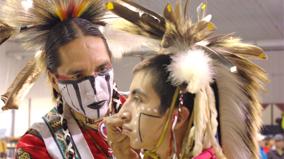Skip to content
Accessibility

New release
Coming
None
Children of the Nomad
2018
2 min
Leaving soon
From a family of nomads, the filmmaker writes a magnificent, poetic letter to her children in which the bicycle becomes a powerful symbol of heritage, transference, and coming together.

-
 5 Shorts Project2015 - 2020 4 editionsLaunched by the NFB’s French Documentary Studio, the 5 Shorts Project seeks to discover new filmmaking talent from Quebec’s regions while exploring the short-form doc genre. Five directors are challenged to create a 4-to-5-minute short with a technical requirement. These independent, individual films will benefit from the cohort’s constructive reflection and interaction.
5 Shorts Project2015 - 2020 4 editionsLaunched by the NFB’s French Documentary Studio, the 5 Shorts Project seeks to discover new filmmaking talent from Quebec’s regions while exploring the short-form doc genre. Five directors are challenged to create a 4-to-5-minute short with a technical requirement. These independent, individual films will benefit from the cohort’s constructive reflection and interaction.
From a family of nomads, the filmmaker writes a magnificent, poetic letter to her children in which the bicycle becomes a powerful symbol of heritage, transference, and coming together.
-
directorEvelyne Papatie
-
producerNathalie CloutierSerge Bordeleau
-
cinematographerDan Popa
-
editingYousra Benziane
-
sound designPatrice LeBlanc
-
sound recordingJonathan Monderie-Larouche
-
production assistantCédric Corbeil
-
musicDenis Jean-Pierre
-
participantGeorgesKokokoÉvelyne
-
technical support - editingPierre DupontIsabelle PainchaudPatrick Trahan
-
titlesMélanie Bouchard
-
online editingDenis Pilon
-
foleyStéphane Cadotte
-
foley recordingLuc Léger
-
narration recordingLuc Léger
-
re-recordingJean Paul Vialard
-
administratorSia Koukoulas
-
production coordinatorChinda Phommarinh
-
internJemmy Echaquan Dubé
-
administrative assistantPascale Savoie-Brideau
-
technical coordinatorMira Mailhot
-
line productionMélanie Lasnier
-
executive producerColette Loumède


















